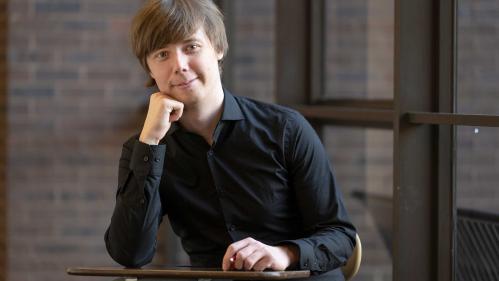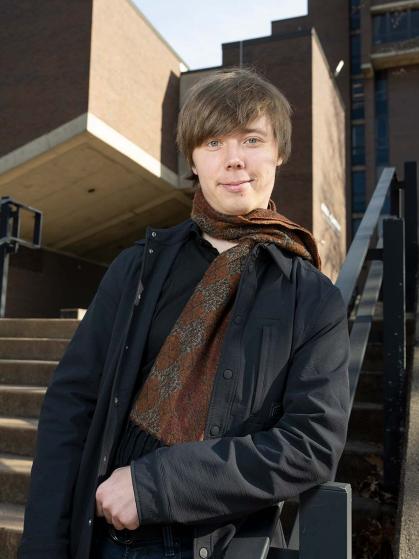Senior Earns Churchill Scholarship, the First at Rutgers in a Decade

Andrew Krapivin, named a Goldwater Scholar last year, plans to build upon his research in computer science at the University of Cambridge
Senior Andrew Krapivin was named a Churchill Scholar, becoming the first Rutgers University-New Brunswick student in a decade to earn the award funding graduate study at the University of Cambridge in England.
The scholarship is the latest academic award for Krapivin, an Honors College student pursuing a double major in mathematics and computer science. Last year, he was named a Goldwater Scholar for his work in theoretical computer science involving the optimization of algorithms.
“I was really surprised,” said Krapivin, a resident of Fair Lawn. “I’ve mainly lived in New Jersey my whole life. It’s a little bit scary to go to a different country for a whole year, but it’s pretty exciting.”
The 21-year-old said the Churchill Scholarship “is an excellent opportunity to really focus on my research and figure out whether I want to pursue a Ph.D. later in my life. Also, I am excited to experience and learn from the different culture and system of education at Cambridge and in England as a whole.”
I was really surprised. I’ve mainly lived in New Jersey my whole life. It’s a little bit scary to go to a different country for a whole year, but it’s pretty exciting.
Andrew Krapivin
Rutgers senior and Churchill Scholar
“He is brilliant,” said Martín Farach-Colton, a former computer science professor at the Rutgers School of Arts and Sciences who now teaches at New York University and is a mentor to Krapivin. “Andrew is the best undergraduate student I had in my 32 years at Rutgers. He was far and away the best student in my graduate algorithms class two years ago.”
Krapivin – whose older brother, Viktor, also is a Goldwater Scholar and a Rutgers–New Brunswick alum – is one of 16 students chosen as Churchill Scholars from the Winston Churchill Foundation of the United States.
At Cambridge, Krapivin plans to pursue a master of philosophy degree in advanced computer science.
His goal is to forge a research-focused career that advances “the theoretical foundations of computation and translating them to applications,” Anne Wallen, director of the Office of Distinguished Fellowships at Rutgers, wrote in a nomination letter to the Churchill Scholarship committee.
Valued at roughly $65,000, the award funds graduate study at Cambridge for U.S. students in the sciences, engineering and mathematics and covers expenses (including tuition, airfare, visa fees and a stipend) for a nine-month or one-year program leading to a master of philosophy or master of advanced study degree. Recipients also may apply for a $4,000 research grant.
“Andrew is an exceptional student who embodies the ideals of academic excellence,” said Rutgers–New Brunswick Chancellor Francine Conway. “We are proud that he will represent Rutgers–New Brunswick at Cambridge, while showing what is possible when Rutgers faculty members mentor students and support them in pursuing their goals.”
Krapivin joined Rutgers during the fall of 2020. As a first-year student, Krapivin’s coursework included an independent study. He was selected for the Rutgers Aresty Summer Research Program for rising sophomores at Rutgers-New Brunswick. He also worked with Jie Gao, a Rutgers professor of computer science, on routing algorithms for decentralized wireless networks.
The following year, Krapivin worked with Farach-Colton and researchers at software maker VMware Inc. on accelerating algorithms with the aim of making databases faster.

Farach-Colton recalled being especially impressed with a theoretical result for a problem that Krapivin devised on his own.
“This is very rare this early on in the research career of a student,” Farach-Colton said. “Normally, the student is given a problem by the adviser. But Andrew read one of my papers and found an open problem that I hadn’t even considered. And he came up with a great solution.”
“I am interested in more perfectly syncing computer science theory with practice,” Krapivin wrote in one of his Churchill essays. “I aim to use real-world issues to motivate new theoretical development and subsequently use this theoretical development to guide practical implementation of solutions in a more direct fashion than typically occurs in computer science.”
“Andrew’s most evident personal characteristic is his curiosity,” Wallen noted in her letter to the Churchill Scholarship committee. “His interests are diverse within his disciplines, but not in a scattered way; rather he relishes finding connections and bringing disparate areas of study together.”
Krapivin stressed he has had a lot of help on his academic journey, crediting his family, instructors such as Farach-Colton and Gao, and Wallen for her help with scholarship applications.
“I have had just about every chance to stumble and fall, but my family and other people in my life have always been really supportive and helped me to a great extent,” he said.
When not conducting research, Krapivin said he enjoys playing chess, dabbling in photography and poetry as well as keeping up with the latest computer technology. (“CPUs, GPUs, AI processors and so on and so forth.”) He also likes to sing.
“I think I have a pretty good voice,” said Krapivin, adding that his favorite songs “come from random places, such as The Phantom of the Opera (I just really love that musical)” and older pop music from the 50s to the 2000s, including K-pop and City Pop, a Japanese genre popular in the 1980s.
Churchill Scholarships were first awarded in 1963, after former British Prime Minister Winston Churchill asked American friends to establish funding for young Americans to study at the university’s Churchill College.




